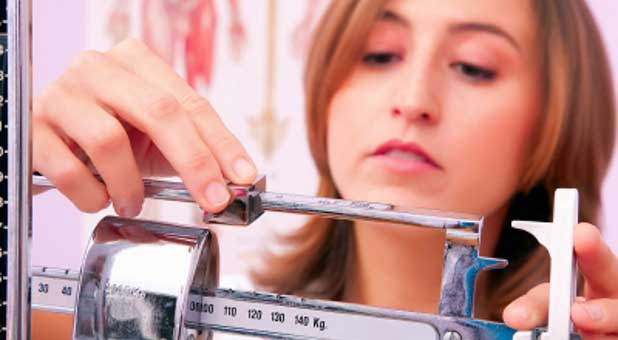Why the Debate About the Right Weight?
A person’s weight is a highly individual issue, but here are some guidelines.
By definition, obese means being 20 percent or more above one’s ideal weight. A person with an ideal weight of 120 pounds would be obese at 144 pounds or more. Overweight, on the other hand, means being 10–19 percent above one’s ideal weight. Our hypothetical person with an ideal weight of 120 pounds would be overweight at 132–143 pounds.
An ideal weight can be set in several different ways. One way is to look at the records of large life insurance companies that are interested in finding predictors of longevity. They have discovered that certain ideal weight-to-height relationships correlate well with optimum life expectancy. The massive actuarial data of the Metropolitan Life Insurance Company formed the basis of its gender-specific Table of Desirable Weight, based on height and bone size.
Although most people have a pretty good idea of their frame size, their wrist—and sometimes ankle—measurements provide a more reliable method. In general, a wrist measurement for women of 5 1⁄4 inches or less is considered small-boned, between 5 1⁄4 to 6 inches is medium, and over 6 inches is large. For men, anything under 6 inches is small, and anything over 7 inches is large.
Here is a time-honored rule of thumb:
For men: Allow 100 pounds for 5 feet of height. For each additional inch, add 6 pounds. The ideal weight for a man 5 feet 10 inches tall would therefore be 160 pounds.
For women: Allow 106 pounds for 5 feet of height, but add 5 pounds for each additional inch. For a woman who is 5 feet 5 inches tall, that comes to 131 pounds. Large-boned men and women should add 5 percent to these figures.
A simpler, more practical test is the pinch test. Trained health professionals use calipers to measure the thickness of skin folds at different places on the body. With the proper tables, they can then calculate body fat percentages with fair accuracy.
You can do a simplified pinch test yourself. Reach over to your left side, just below the last rib, and pull the skin and fat away from the underlying muscle. Hold it between your thumb and index finger and squeeze. If the space between your thumb and finger is more than three-fourths of an inch, you’re in trouble!
Knowing your ideal weight is important. Studies show that people who remain near their target live longer, healthier lives. Find out how close (or far) you are from your ideal weight.
The preceding is an excerpt from 201 Secrets to Healthy Living (Siloam). The book can be purchased at Amazon.com, Barnesandnoble.com or Christianbook.com.














































